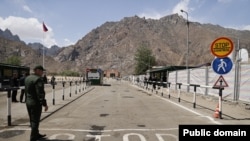Official readouts of the call made no explicit mention of the issue. Pezeshkian was cited by his office as calling Armenian-Iranian relations “historical, friendly and constructive.”
“He noted that the Islamic Republic’s policy is to engage constructively with all neighboring countries while respecting the territorial integrity of all nations,” said the office.
The Armenian government’s press office reported, for its part, that the two leaders discussed unspecified “issues related to the bilateral, regional and international agenda.” Pashinian invited Pezeshkian to pay an official visit to Yerevan, it added in a short statement.
Ali Akbar Ahmadian, the secretary of Iran’s Supreme National Security Council, phoned his Armenian opposite number, Armen Grigorian, on Thursday. Deputy Prime Minister Mher Grigorian, who has been actively involved in Armenian-Azerbaijani talks on transport links, met with the Iranian ambassador in Yerevan, Mehdi Sobhani, the next day. According to official Armenian sources, they discussed “recent regional developments” and efforts to “unblock regional communication routes.”
The Iranian Mehr news agency reported on Saturday that Ahmadian “reiterated Iran’s consistent opposition to any shifts in the geopolitical landscape of the region.” It said Armen Grigorian “briefed Ahmadian on the latest developments in negotiations with the Azerbaijani side and stressed that Armenia's position regarding regional transit routes has not changed.”
The Armenian-Iranian contacts followed Pashinian’s July 16 news conference during which he signaled readiness to let a U.S. company run a road and railway to Azerbaijan’s Nakhichevan exclave passing through an Armenian region bordering Iran. The premier was accused by his domestic critics of acceding to the Azerbaijani demands for an extraterritorial land corridor. He met with Azerbaijani President Ilham Aliyev in the United Arab Emirates on July 10.
Iran is strongly opposed to the opening of such a corridor. It has repeatedly warned Baku against attempting to strip the Islamic Republic of the common border or direct transport links with Armenia. In a clear reference to the United States and other Western powers, Iranian leaders have also spoken out against the presence of “extra-regional” forces in the South Caucasus.




